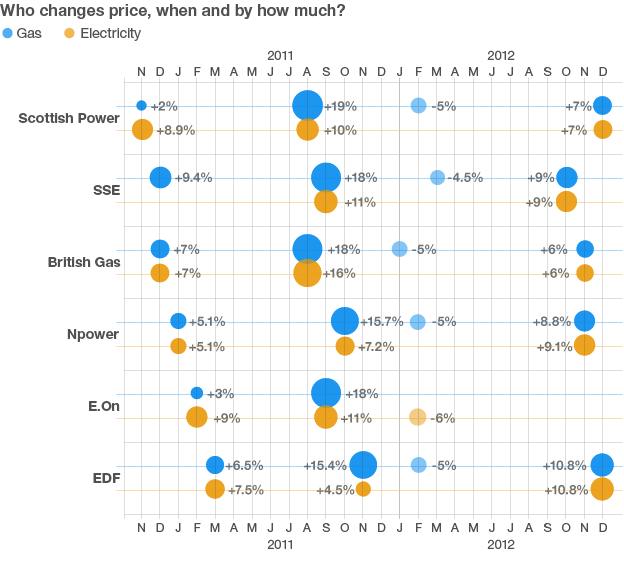EDF to raise gas and electricity prices by 10.8%
- Published
EDF's Martin Lawrence: "We recognise it is difficult news at this time and we regret these price rises"
EDF Energy customers will see a 10.8% rise in gas and electricity prices from 7 December, the company has announced.
EDF, which has three million domestic customers, is the fifth major energy firm to announce price rises and it is the biggest average increase so far.
The company blamed the cost of wholesale energy and government charges including mandatory energy efficiency and social schemes.
Downing Street called the rise "very disappointing".
The energy minister Greg Barker said that the rise was "unwelcome" for families struggling with household bills. He added that more details on how customers could get the best tariff would be outlined in the Energy Bill in the next few weeks.
Labour's shadow energy secretary Caroline Flint said millions faced "a winter of misery as EDF clobber households with above-inflation price rises at the very time they can least afford it.
"People will not understand why EDF are hiking up their bills by so much when they made nearly £1.6 billion in profits last year," she said
EDF director Martin Lawrence said the company recognised that people do not want to see prices going up.
"It is worth pointing out that one in five of our customers are already on competitive fixed priced tariffs and will not be affected by these price changes this winter," he said.
Other price rises
EDF, which claimed that its prices would still be lower than the other major suppliers who have already announced price rises, said that the average dual fuel bill would go up by £2.35 a week, the equivalent of more than £122 a year to bring the total bill to £1,251 a year.
The price rise is higher in percentage terms than any of the other suppliers, and leaves E.On as the only supplier among the big six yet to announce price rises this autumn and winter.
E.On has previously said that it would leave prices unchanged for the rest of the year.
The round of price changes has prompted some political debate, and has come as the energy regulator Ofgem announced plans to simplify bills to make the switching process easier.
However, some uncertainty remains over Prime Minister David Cameron's comments that energy suppliers would be forced to put their customers on the cheapest tariff.
Labour has called for a new energy regulator to be created.
'Pack behaviour'
All the latest energy price rises are displayed as an average across the UK. However, price changes might differ depending on where residents live in the country.

An average EDF Energy bill will rise by £122 a year, the company said
EDF cut gas prices by 5% in the spring, and was the last of the big six to announce price rises last winter, when it put up gas prices by 15.4% and electricity prices by 4.5%.
It has pledged that about 100,000 of its most vulnerable elderly customers would only be charged the equivalent of its cheapest tariff from this winter.
Ann Robinson, of price comparison website Uswitch.com, said: "This is the final hammer blow for energy bills this side of Christmas. Consumers now face a winter of rationing their energy usage - many will be forced to turned their heating down or off for fear of the impact of these hikes.
"However, we welcome EDF Energy's support for its most vulnerable elderly customers who will automatically benefit from its cheapest prices. This could be a lifeline for many."
Audrey Gallacher, director of energy at Consumer Focus, said: "Another price rise, hot on the heel of those we have already seen, will again feed into consumer concerns on pack behaviour and whether price changes are driven by real supply and demand issues.
"Energy companies obviously need to react to wholesale and other pricing pressures, but customers need to know the scale of changes is justified."

- Published24 October 2012
- Published20 November 2012
- Published27 July 2011